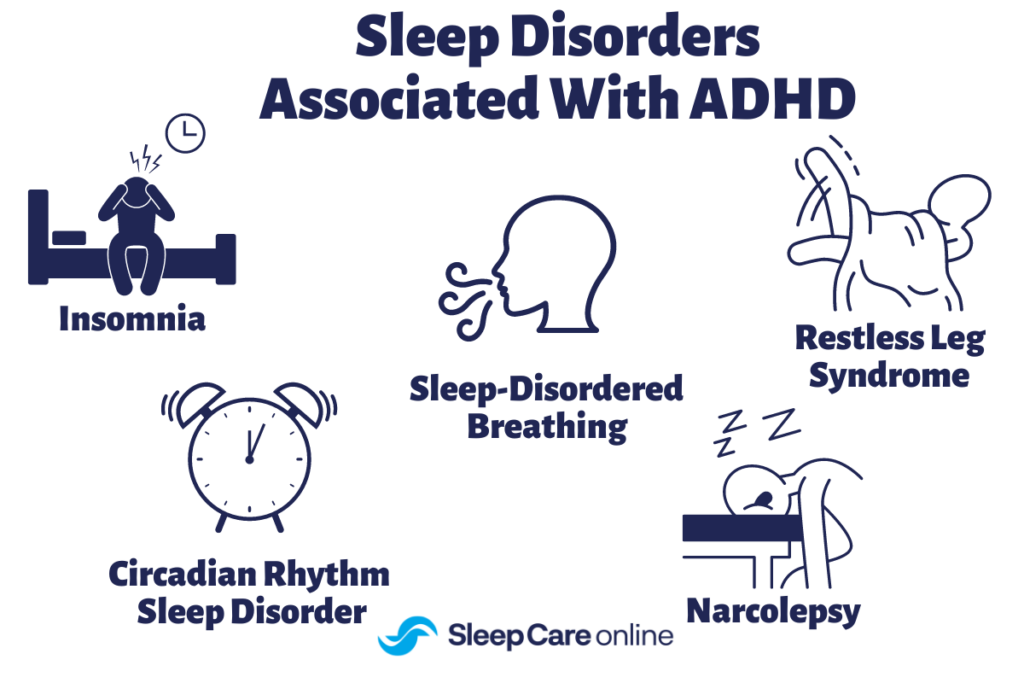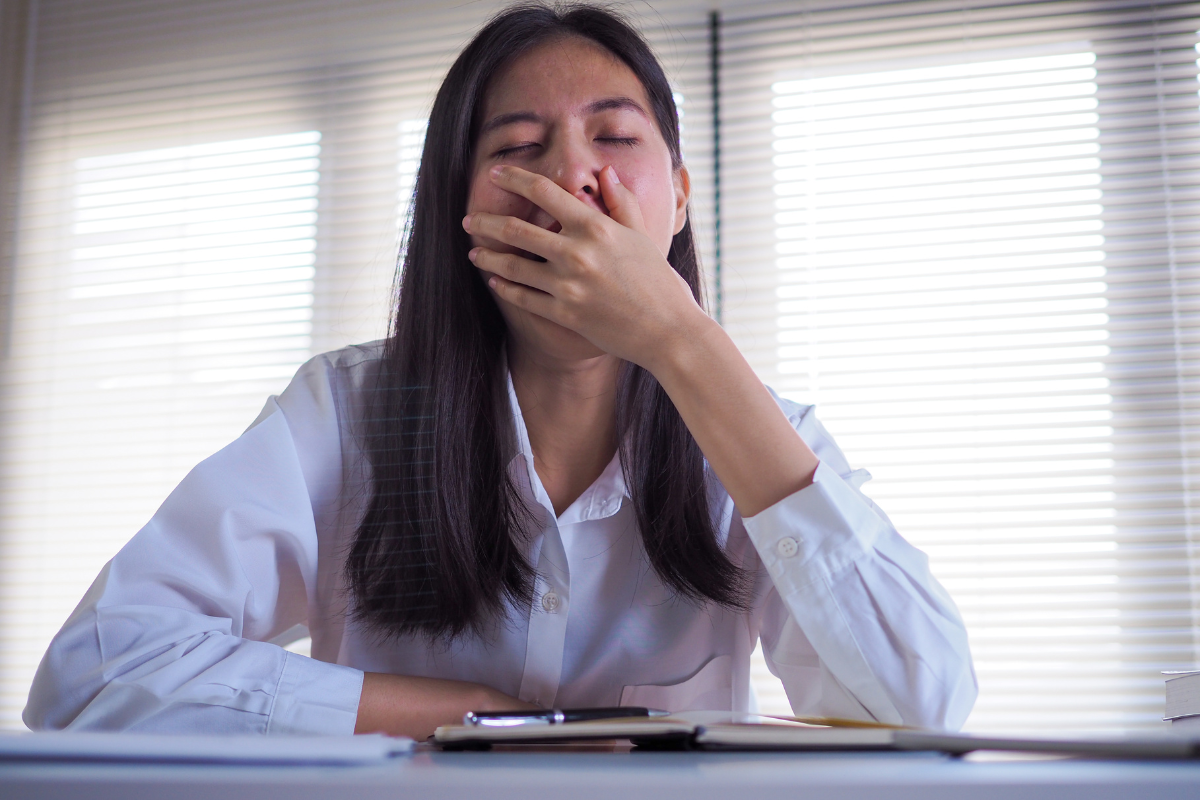Key Takeaways:
- Sleep apnea and ADHD are two conditions that individuals can have and can sometimes exist together.
- These conditions’ symptoms can also be the same and they include: daytime sleepiness, irritability, and hyperactivity.
- Making the distinction between the two disorders can be challenging, so learning more and talking to your healthcare provider is highly beneficial.
Attention-Deficit/Hyperactivity Disorder, also known as ADHD, affects approximately 11% of school-age children.1 Many of the symptoms of ADHD, however, may be similar to those of sleep apnea. Making the distinction is especially important for children, and even adults, who may be misdiagnosed with ADHD when they really have sleep apnea.
What is ADHD?
ADHD is a neurodevelopmental disorder that affects functioning in different areas of life ranging from personal and social, to academic or occupational. The disorder may impede attention or memory, affect perception and social interaction, and impact language and problem-solving abilities. While the typical conversation surrounding ADHD focuses on children, approximately 10 million adults live with the disorder.1
Symptoms of ADHD
There are three presentations of ADHD – Predominantly Inattentive, Hyperactive-Impulsive, and Combined. Due to the similarity of these symptoms with other disorders, diagnosed children should show at least six symptoms, while adolescents and adults should present at least five. These symptoms can include:
- Careless mistakes
- Inattentiveness
- Easily losing things
- Disorganization
- Forgetfulness
- Difficulty remaining still or seated
In adults, hyperactivity may present as extreme restlessness.
How Does ADHD Affect Daily Life?
People with ADHD may have trouble focusing on the task at hand, whether that be daily chores, schoolwork, or the workload at their job. This could lead to missing deadlines, social events, forgotten meetings, and more. Additionally, people with ADHD and sleep apnea are more likely to have depression, anxiety, and other mental disorders.
Do People with ADHD Have Trouble Sleeping?
People with ADHD may have trouble falling asleep and staying asleep. The sleep deprivation that results may worsen ADHD symptoms. Sleep problems stem from many common behaviors in people suffering from ADHD. ADHD patients may:
- Have trouble keeping a schedule: resulting in erratic sleep patterns that throw off their natural circadian rhythm.
- Use medications that may disrupt sleep: medications often prescribed for ADHD can affect sleep as a side effect.
- Other issues from their ADHD: from depression to anxiety to substance abuse, many ADHD patients must contend with other mental health issues along with ADHD which can further worsen their ability to sleep peacefully.

Sleep Disorders Associated With ADHD
- Insomnia: Insomnia can occur in someone who has ADHD and may make it difficult to settle down at night. You may experience racing thoughts and nighttime energy, causing you to not be able to fall asleep. Many people with ADHD and insomnia may experience extreme tiredness during the day as well. Over time, insomnia may worsen and lead to feeling stressed at night. There are a few steps you can take to try and avoid ADHD insomnia including avoiding daytime napping, avoiding drinking caffeine at least 4 hours before bed, having a calming bedtime routine, and making sure the curtains are drawn and your electronics/lights are off so you can fall asleep in a dark and quiet room.
- Circadian Rhythm Sleep Disorders: Adults with ADHD may often have sleep problems because of their circadian rhythm being delayed. Irregularities in your body’s internal clock will delay your production of melatonin, leading to a disruption in your natural circadian rhythm. When your sleep cycle is impacted by ADHD, it can interfere with time-sensitive activities (like school or work) and other responsibilities as well. Circadian rhythm sleep disorders can also make it more difficult to fall asleep at night, which will result in daytime sleepiness, confusion, and lack of focus/concentration the next morning. To help avoid disruptions in your circadian rhythm and to regulate your sleep-wake cycle, taking a melatonin supplement at targeted times may be beneficial.
- Sleep-Disordered Breathing (SDB): SDB includes both snoring and sleep apnea and can lead to disrupted sleep because of its associated side effects. This results in daytime sleepiness and other symptoms of ADHD. To help with SDB in children, research has shown that removing the tonsils may be advantageous. To help with sleep apnea in adults, CPAP therapy is a great choice.
- Restless Legs Syndrome (RLS): RLS is a condition that makes you feel tingling sensations in your legs, making it hard to fall asleep. This occurs commonly in those who have ADHD and is caused by deficiencies in iron and dopamine. If children have both ADHD and RLS, they are not getting the proper restorative sleep they need, resulting in daytime sleepiness and drowsiness. Additionally, the severity of RLS symptoms is correlated with the severity of ADHD symptoms.
- Narcolepsy: Narcolepsy makes you fall asleep suddenly during the day or causes trouble sleeping throughout the night. The sleepiness brought on by narcolepsy may provoke ADHD symptoms. Adults with narcolepsy may experience more extreme symptoms of ADHD, and narcolepsy can usually be tested with medication.
What is the Link Between ADHD and Sleep Apnea?
Sleep apnea is a common sleep disorder that affects approximately 22 million American adults and approximately 1-3% of children aged 8 & under.2 Sleep apnea most typically occurs when the airway is obstructed, causing repeated stops in breathing throughout the night. In children, the most common cause of obstruction is enlarged tonsils. Symptoms include loud snoring, daytime sleepiness, difficulty concentrating, forgetfulness, and mood swings.
However, according to the Mayo Clinic, pediatric sleep apnea may also cause the following daytime symptoms:
- Difficulty learning
- Inattentiveness
- Behavioral problems
- Hyperactivity
Sleep Apnea Or ADHD
After a closer look, it is easy to see why cases of obstructive sleep apnea in children may get misdiagnosed as ADHD. ADHD presents several common symptoms, found in various other disorders. Oftentimes, children diagnosed with ADHD will present with at least one other coexisting condition, including sleep disorders.1
Misdiagnosis of ADHD does not only happen to children. Many adults suffering from sleep deprivation may be diagnosed with ADHD, which can lead to incorrect treatment. While a diagnosis of ADHD is difficult, a diagnosis of sleep apnea is easy. All it takes is a home sleep test.
Does ADHD Affect Sleep Apnea in Adults?
While someone with ADHD may already be struggling to sleep well, the addition of sleep apnea makes healthy sleep even more difficult. About 3% of all people and 25% of those with ADHD have sleep apnea or some other “sleep-disordered breathing” problem. ²
Along with managing their ADHD, people with the condition must also take steps to reduce their obstructive sleep apnea. The use of CPAP therapy helps minimize apnea episodes at night so that periods of sleep that can be achieved are more restful.
Sleep apnea patients with ADHD can also focus on lifestyle changes to help reduce the impact of sleep apnea on their ADHD. They can avoid smoking and drinking alcohol and maintain a healthy weight.
Importance of Sleep Study for Detecting Sleep Apnea in ADHD Patients
Many patients with ADHD may be so focused on managing their illness that they may not realize the impact sleep loss from sleep apnea is having on their overall health. ADHD patients may not associate sleep loss with anything serious. But they should look for the warning signs of sleep apnea including:
- Snoring loudly at night
- Waking up gasping for air at night
- Consistent morning headaches
- Morning dry mouth
- Drowsiness during the day
- Non-refreshed feeling in the morning after waking up
If ADHD patients have any of these symptoms it is a good idea to take a test for sleep apnea.
How To Diagnose Sleep Apnea At Home if I Have ADHD?
Sleep Care Online offers a Complete Care Package – a convenient, affordable way to test for sleep apnea from the comfort of your own home. Here’s how it works:
- With the Complete Care Package, schedule a 10-minute telehealth visit with a healthcare provider to discuss your symptoms, upcoming sleep study, test results, and treatment options.
- A multi-night, disposable home sleep apnea test is mailed to your home to be completed at your convenience.
- A physician analyzes the sleep data and provides a prescription if needed.
- Schedule an optional follow-up appointment (additional fee applies).
- We connect you to sleep experts who can offer customized sleep therapy options, assistance in equipment purchase, and initial set-up.
If you have any questions about our Complete Care Package, contact our customer care team at 866-465-4478. We are also available via email at contact@sleepcareonline.com. Home sleep apnea tests and telehealth services are now available nationwide.
References
- Children and Adults with Attention-Deficit/Hyperactivity Disorder. About ADHD. Accessed Oct 2020.
- Cataletto, Mary E, MD. MedScape. Childhood Sleep Apnea. Updated 2019 Feb 13. Accessed Oct 2020.

Dr. Kunal Agarwal is a highly accomplished board-certified physician specializing in Family Medicine, Sleep Medicine, and Obesity Medicine. He completed his residency at Michigan State University and a fellowship at Henry Ford Health System, and has over a decade of experience delivering exceptional patient outcomes. Dr. Argarwal is passionate about patient education and advocacy, sleep disorders, and more. His expertise in treating sleep apnea is extremely valuable to improve his patients’ lives.
Awards, Honors, & Recognition
Top Doctor
SRQ Magazine and Sarasota Magazine, 2023-2024
Fellow of American Academy of Sleep Medicine (FAASM)
American Academy of Sleep Medicine, 2021
Named “Top Doctor” for 2017, 2018 (on cover), 2019,and 2020 by Delaware Today Magazine
2017-2020




